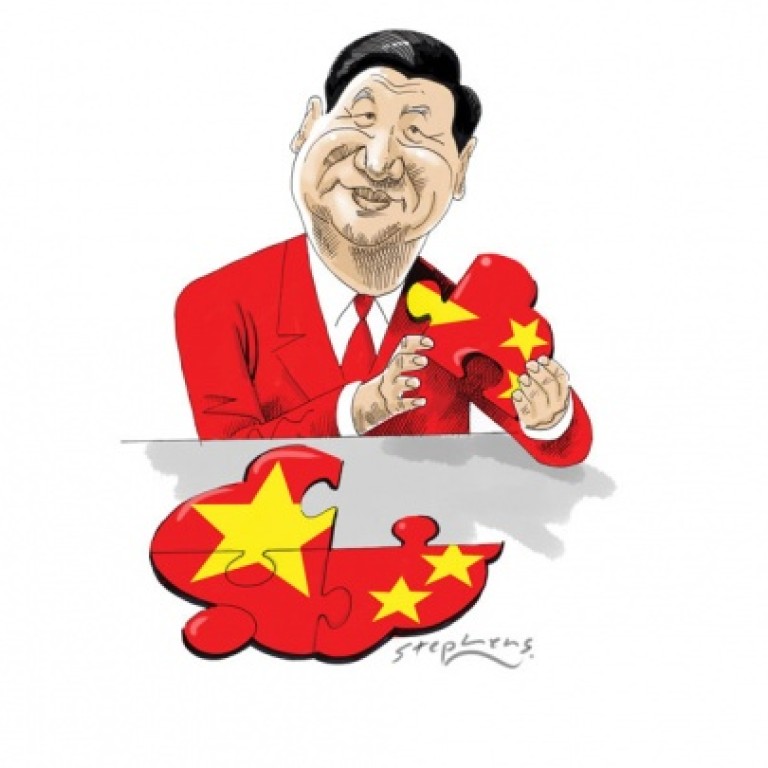
Xi Jinping, a nationalist and a reformer
Robert Lawrence Kuhn says the fear that Xi will take China on an expansionist course may be overblown, when his words and deeds are understood in the context of Chinese politics
What to make of President Xi Jinping, who holds his first summit with President Barack Obama this week? The hope is that Xi is a reformer, who will guide China through domestic transformation and to responsible statecraft. The fear is that Xi is a nationalist, who has set China on an aggressive, expansionist course of bullying its neighbours and confronting the US.
The fear seems not unfounded. China has intensified its territorial claims, from island disputes with Japan to vast areas of the South China Sea. Xi frequently inspects People's Liberation Army forces, especially naval fleets, exhorting China's military to "get ready to fight and to win wars" and "to win regional warfare under IT- oriented conditions".
Xi's nationalism is a strategy of "offence is the best defence" - an inoculation against being labelled "soft"
Xi holds China's three top positions, and is set to lead China for a decade.
Just after becoming party chief late last year, Xi announced what would become the hallmark of his administration. "The Chinese Dream", he said, is "the great rejuvenation of the Chinese nation."
Xi's Chinese Dream is described as achieving the "Two 100s": first, the material goal of China becoming a "moderately well-off society" by about 2020, around the 100th anniversary of the Chinese Communist Party; second, the modernisation goal of China becoming a fully developed nation by about 2049, the 100th anniversary of the People's Republic of China.
The Chinese Dream has four parts: Strong China (economically, politically, scientifically, militarily); Civilised China (equity and fairness, rich culture, high morals); Harmonious China (amity among social classes); Beautiful China (healthy environment, low pollution).
"A moderately well-off society" is where all citizens, rural and urban, enjoy high standards of living. This includes doubling the 2010 per capita gross domestic product (approaching US$10,000) by about 2020 and completing urbanisation (roughly 1 billion people, 70 per cent of China's population) by about 2030. "Modernisation" means China regaining its position as a world leader in science and technology as well as in economics and business; the resurgence of Chinese civilisation, culture and military might; and China participating actively in all areas of human endeavour.
What about Xi's nationalism? If it seems at odds with these grand goals, it is not. Here are six reasons why.
-
Consolidate power. Xi was not selected by Deng Xiaoping , the architect of reform, as were his predecessors - Jiang Zemin and Hu Jintao . Neither was Xi elected by the people. Conventional wisdom had it that he would be a weak leader. In order to realise his Chinese Dream, Xi needs to assert strength and assure control. So far, he has exceeded expectations.
- Enable reform. Xi and Premier Li Keqiang are determined to enact far-reaching economic reforms, the most extensive in 15 years, but there is stiff resistance from those whose dominance would be diminished and benefits cut. This resistance appeals to nationalistic aspirations by accusing reformers of "worshipping Western ways", "glorifying Western models", "caving in to Western pressures".
Xi's proactive nationalism is a strategy of "offence is the best defence" - an inoculation, as it were, against the political virus of being labelled "soft" or "pro-Western". Reformers in China are generally associated with pro-American attitudes and thus subject to fierce public criticism, even ridicule. By establishing himself as a strong-willed nationalist, operating independently of the US, Xi secures economic reforms by distinguishing them from serving Western/American interests.
It is no coincidence that Xi's first China-US summit follows his multifarious and emphatic exemplars of nationalism. When Xi now enacts reforms, how can he be accused of bowing down to Western/American ideals, when his international actions and assertions are so assured and decisive?
-
Legitimise party rule. To perpetuate its one-party rule, the Communist Party has constructed a grand narrative that is founded on three critical claims: only it can continue to improve citizens' standard of living; only it can maintain a stable, unified country and construct a happy, harmonious society; and only it can effect the "rejuvenation of the Chinese nation".
-
Maintain stability through unity. China faces numerous internal tensions, especially those stemming from a class-divided populace (rich-poor, urban-rural, coastal-inland), that have erupted within one generation. An increasingly complex society can fracture along multiple fault lines. Pollution, corruption, health care, housing, migrant workers, workers' wages, social cynicism and changing values, among other raging issues, threaten to fragment society - and all are exacerbated by the most energetic social media on earth. Only Chinese nationalism, which resonates across society, can provide sufficiently strong social glue.
-
Differentiate from predecessors. Top Chinese leaders must combine historical continuity with their own distinguishing theories and practices. How shall Xi fare? Economic growth rates must decline, and a host of domestic tensions are coming his way. Hence, Xi is making nationalism the core of his leadership; his nationalism is proactive, riding the high road of patriotism and using pride as his differentiator.
- Personal belief. Xi has deep-seated patriotic convictions, the product of family, life and career. His father, Xi Zhongxun , was a founder of New China and a leading reformer under Deng. In 2006, when Xi Jinping was party secretary of Zhejiang province, he told me about Chinese pride and patriotism as motivating China's historic resurgence, words remarkably similar to his recent pronouncements.
So is Xi a reformer? A nationalist? The answer is he is both, because only by being a nationalist can he be a reformer. American policy must understand Xi's nationalism, so that when the reigning superpower meets the rising superpower, both can benefit. The world would applaud.

